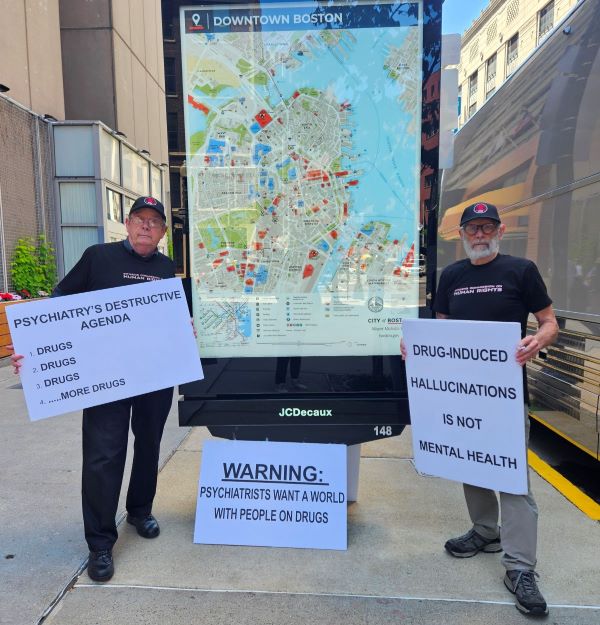It is not known how psychedelic drugs are supposed to work as mental health treatment. Psychedelics carry the risks of devastating immediate and long-term harms, putting human lives and sanity at risk.
Drawing attention to the dangers of psychedelic drugs, the Citizens Commission on Human Rights (CCHR) protested outside the Boston site of a conference of researchers, academics, and industry representatives engaged in psychedelic drug research and the push for regulatory approval and commercialization of various hallucinogenic drugs for claimed health and mental health benefits.
The New England chapter of CCHR organized the protest to raise awareness of the considerable and dangerous mental health hazards of the drugs after pro-psychedelics organizations gathered enough signatures to qualify a Massachusetts ballot measure for the November 2024 election which would permit the use of psychedelics as therapy in the state.

Psychedelics are hallucinogens, a class of drugs that cause hallucinations, which are profound distortions in a person’s perceptions of reality. The National Institute on Drug Abuse (NIDA) says that psychedelic drugs can “produce adverse or debilitating psychological effects” and that the drugs can cause “impaired thought processes and perception” that have been linked to dangerous behavior and injuries.
Long-term adverse effects NIDA lists for various psychedelic drugs, such as psilocybin (“magic mushrooms”) and LSD (“acid”), are memory problems, spontaneous and frightening flashbacks called hallucinogen persisting perception disorder, and persistent visual disturbances, disorganized thinking, paranoia, and mood swings. Research has found that from 5% to 50% of hallucinogen users experience at least one flashback.
Demonstrators at the CCHR protest handed out flyers that asked people to consider their airline pilot, their child’s daycare provider, or the driver next to them on the highway suddenly experiencing a flashback that alters their thinking and perceptions.
While some psychedelics researchers have contended that adverse effects of psychedelics are of short duration or rarely happen, the lived experience of users provides evidence that negative side effects are more common, dangerous, and long-lasting than what those researchers claim. Readers’ online comments in response to a recent New York Times article on a “psychedelics revolution” reported numerous incidents of dangerous “bad trips,” traumatic experiences, worsened mental health, violent or self-destructive behavior, resulting psychiatric hospitalizations, and deaths from taking psychedelic drugs.
Just as the package inserts for some prescribed psychiatric drugs disclose that it is not known how the drugs are supposed to work to treat mental health issues, it is also not known how psychedelic drugs are supposed to work as treatment.
The huge commercial profit potential for drug manufacturers and “psychedelic-assisted therapy” providers is driving research and efforts to gain drug regulatory approval. Biotech industry analysts project that psychedelic treatment for depressed individuals whose antidepressant treatment failed could reach $10 billion in annual sales, but far greater profits would be available if many of the 45 million Americans currently taking antidepressants switched to psychedelics. A single session of psychedelic-assisted therapy with psilocybin reportedly costs from $1,500 to $3,500.
Summing up the opposition to psychedelic drugs as treatment, attorney Colbe Mazzarella, president of CCHR New England, emphatically pointed out the inherent contradiction: “Hallucination is not mental health.”
CCHR opposes putting human lives and sanity at risk with psychedelic drugs and will continue to alert the public to the dangers of the drugs.
